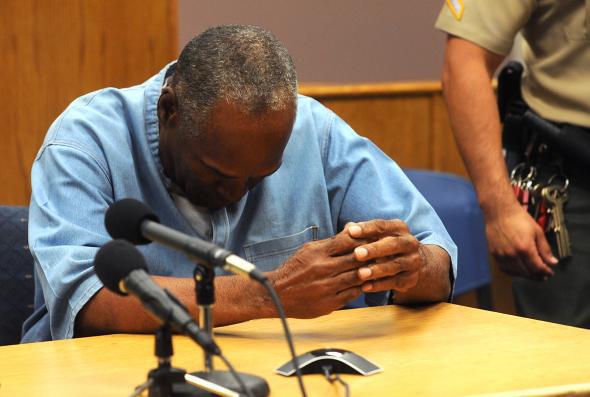O.J. Simpson will be freed in October after nine years in a Nevada prison, the state parole board ruled on Thursday, opting to release the Hall of Fame running back on his first opportunity for parole on his remaining charges. Simpson, now 70 years old, was serving a minimum nine-year sentence for a host of charges related to an armed robbery of a sports memorabilia dealer in a Las Vegas hotel room in 2007. Simpson was convicted a year later, in 2008, and sentenced to 33 years by the judge with the possibility of parole after nine years, making the celebrity inmate eligible for parole for the first time on Oct. 1.
Simpson, of course, is best known for the 11-month trial that acquitted him of the 1994 murders of Nicole Brown Simpson and Ronald Goldman. The racially charged trial and verdict made householde names out of everyone involved. Two years after his acquittal, Simpson was found guilty in a wrongful death suit, where the burden of proof is lower, and was ordered to pay $33.5 million in damages. Simpson has paid only a small fraction of that sum. The former USC running back was forced to auction off his Heisman trophy and other memorabilia in 1999, but has largely been successful hiding whatever assets he has left.
Simpson was arrested in Las Vegas in 2007 for forcibly taking sports memorabilia that Simpson still says was his from a memorabilia dealer, who was also a friend. Two armed men accompanied Simpson during the encounter, which significantly escalated the severity of the charges. Simpson still says he didn’t know the men were carrying firearms. The robbery took place on the same day Simpson’s book If I Did It: Confessions of the Killer, based on a series of interviews with Simpson, was published. A Florida court ruled to prevent Simpson profiting from the sale of the book and a bankruptcy court awarded the rights of the book to the family of Ronald Goldman. On the front cover of the book, the “If” in the title was reduced to such a small font as to be illegible. During the trial, jurors were instructed to disregard Simpson’s previous indiscretions and came back with a guilty verdict that was handed down 13 years to the day after Simpson was acquitted for the murders of Nicole Brown and Ronald Goldman.
The parole hearing, like most things related to O.J. Simpson over the past three decades, received overwhelming media attention. Last year, ESPN’s O. J.: Made in America, and FX’s The People v. O. J. Simpson: American Crime Story, brought Simpson’s life and trial back into the public eye. While in prison, one of the guards wrote a book to profit off Simpson’s presence at the correctional facility called Guarding the Juice: How O.J. Simpson Became my Prison BFF that chronicled the daily life of Simpson behind bars. Simpson’s legal team dismissed the book in a press conference following the parole hearing.
“Mr. Simpson has said he wants to return to Florida, and officials there and in Nevada said they are trying to negotiate an agreement for that move,” according to the New York Times. “If he violates the conditions of his parole—which are likely to bar him from having weapons or associating with criminals—he could return to prison to serve out his full sentence.”
